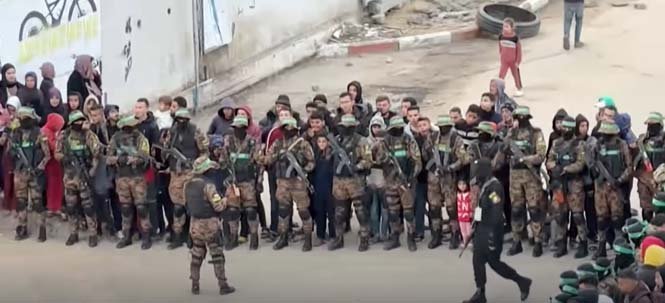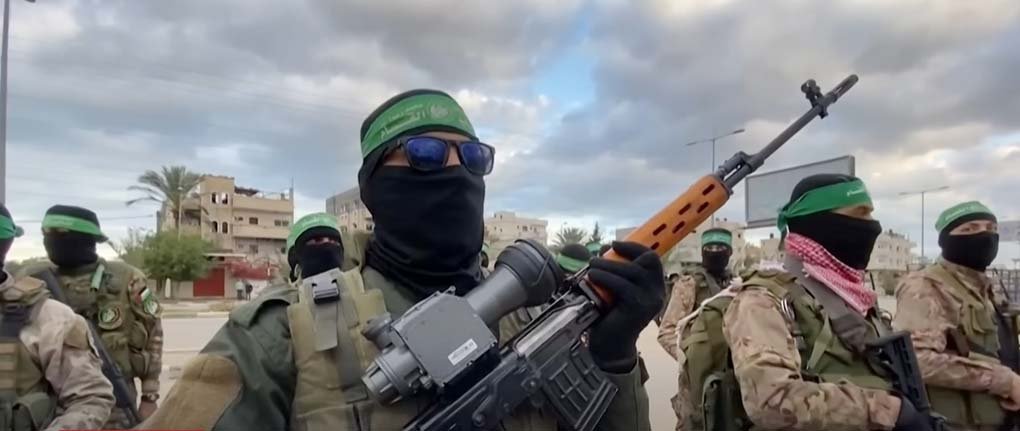Introduction
In a pivotal development that could reshape the trajectory of the Israel-Hamas conflict, the militant group announced plans to release three hostages on Thursday, framing the move as a “goodwill gesture” to reinvigorate ceasefire negotiations. The decision, mediated by Egypt and Qatar, follows weeks of deadlock and escalating violence that has claimed over 1,350 lives and displaced tens of thousands. According to Al Jazeera, the hostages—two Israeli women and a Thai national—were captured during Hamas’ October 7 cross-border attack. While their identities remain confidential, the announcement has sparked cautious optimism among families and diplomats alike, even as both sides brace for complex talks ahead.
Ceasefire Talks: A Fragile Breakthrough
The hostage release, verified by Hamas’ military wing spokesperson Abu Ubaida in a late-night statement, marked the first meaningful breakthrough since discussions halted in early November. Reuters adds that the arrangement rests on a proposed 72-hour humanitarian ceasefire, during which Hamas would free the detainees in exchange for Israel releasing 150 Palestinian inmates, primarily women and youngsters. Israeli Prime Minister Benjamin Netanyahu’s office responded cautiously, noting, “We are evaluating the proposal,” but emphasizing that military operations “will continue until all hostages are home.”
Behind the scenes, Egyptian and Qatari mediators have worked feverishly to bridge differences. Egypt’s intelligence chief, Abbas Kamel, reportedly shuttled between Cairo and Doha this week to settle arrangements. “This isn’t just about hostages—it’s about stopping a war that’s starving children,” said a senior Egyptian official, speaking anonymously to The Associated Press.
Humanitarian Crisis Deepens Amidst Diplomacy
As diplomats negotiate, Gaza’s 2.3 million residents face unprecedented suffering. The UN estimates that 85% of the population is displaced, with overcrowded shelters reporting outbreaks of hepatitis A and cholera. In northern Gaza, where Israeli airstrikes have reduced neighborhoods to rubble, hospitals operate without anesthesia or clean water. At Al-Shifa Hospital, Dr. Marwan Al-Hams shared a harrowing account with BBC: “We’re using vinegar to sterilize wounds. Mothers beg us to save their children, but we have nothing left.”
Meanwhile, aid convoys remain bottlenecked at the Rafah crossing, with only 10% of pre-war supplies entering daily. The World Food Programme (WFP) warned this week that Gaza faces “imminent famine,” with 90% of families skipping meals for days. “We’re negotiating for crumbs while people starve,” said UNRWA Commissioner-General Philippe Lazzarini during a press conference in Geneva.
Families’ Agony: “Every Second Feels Like a Year”
For hostage families, the announcement is a fragile lifeline. Among the captives is 34-year-old Adva Adar, whose mother, Yael, described the ordeal to Times of Israel: “I haven’t slept since October. When I close my eyes, I see her face.” Adva’s cousin, Tamir, joined weekly protests in Tel Aviv, where thousands demand swifter government action. “Politicians play games, but we’re fighting for our flesh and blood,” he said.
In Gaza, the ceasefire debate is equally personal. Ahmed Abu Selmia, a father of four sheltering in Khan Younis, recounted surviving an airstrike that killed his neighbors. “My kids ask if they’ll die tonight. What do I tell them?” he said, his voice breaking. “We’re not Hamas. We’re just people trying to live.”

Regional and Global Stakes
The hostage deal carries implications far beyond Gaza. Egypt, wary of spillover violence, has threatened to suspend its 1979 peace treaty with Israel if Rafah becomes a battleground. Qatar, meanwhile, walks a diplomatic tightrope—its financial support for Gaza clashes with its role as a U.S. ally hosting Hamas’ political office. The Wall Street Journal notes that Washington has pressed Doha to leverage its Hamas ties, with Secretary of State Antony Blinken calling the hostage release “a critical step toward regional stability.”
Globally, divisions persist. While the U.S. and EU draft a UN resolution for a “sustainable ceasefire,” Russia and China demand an immediate, unconditional end to hostilities. At a heated Security Council session, Palestinian Ambassador Riyad Mansour accused Israel of “state-sponsored genocide,” while Israel’s envoy Gilad Erdan condemned Hamas for “weaponizing human suffering.”
Obstacles to Peace: A History of Broken Promises
Previous ceasefires—like the 2021 truce mediated by Egypt—collapsed within days over charges of infractions. Hamas maintains any sustainable compromise must eliminate Israel’s 16-year blockade of Gaza, which restricts the passage of commodities and people. Israel demands the removal of Hamas’ military infrastructure and the return of all hostages. “Neither side trusts the other, and both have hardliners sabotaging talks,” said Mairav Zonszein, a senior analyst at the International Crisis Group, in an interview with CNN.
Complicating matters, Hamas’ armed wing and political leadership are reportedly divided. While Qatar-based leader Ismail Haniyeh backs negotiations, Yahya Sinwar, Hamas’ chief in Gaza, opposes concessions. “Sinwar believes survival depends on resistance, not deals,” a source told The Guardian.
A Path Forward: Cautious Hope
Despite challenges, mediators see a narrow path. The phased release of hostages—beginning with three, followed by groups of 10—could build momentum. Egyptian state media claims Israel has agreed to fuel shipments to Gaza if the initial phase succeeds. For families, even a fleeting truce offers respite. “I don’t care about politics. I just want my daughter back,” said Yael Adar, her words echoing across a divided region.
Summary
Hamas’ decision to release three hostages offers a fragile opening in a war marked by immeasurable loss. As global powers scramble to avert famine and families cling to fading hope, the stakes extend beyond Gaza—testing the limits of diplomacy, humanity, and the international order. While the road to peace remains fraught, this small gesture underscores a universal truth: in war, every life saved is a victory.
Related Video (Video Link)
Sources
- Al Jazeera: “Hamas Announces Hostage Release Following Mediation Efforts”
- Reuters: “Ceasefire Talks Advance as Hamas Proposes Prisoner Swap”
- The Associated Press: “Gaza’s Humanitarian Crisis Nears Breaking Point”
- BBC: “Inside Gaza’s Collapsing Hospitals”
- The Wall Street Journal: “Qatar’s Delicate Role in Israel-Hamas Negotiations”
- CNN: “Divisions Within Hamas Complicate Ceasefire Efforts”
Explorer More:
- Trump’s Gaza Takeover Shocks: Netanyahu, Jordan’s Ceasefire Clash
- Hamas Halts Hostage Release, Accusing Israel of Ceasefire Breach
- Saudi Arabia Slams Netanyahu’s Proposal To Host Palestine: “A Political Stunt,” Says Riyadh
- Egypt Fights Trump Gaza Expulsion as Israel Prepares: Palestinians Resist
- UN Chief Warns of ‘Ethnic Cleansing’ After Trump’s Gaza Plan
- Trump’s Foreign Aid Freeze Boosts Authoritarian Regimes Worldwide
- Netanyahu Delays Ceasefire Talks, Meets Trump Amid Escalating Tensions
- Israeli Prime Minister Netanyahu Heads to U.S. for High-Stakes Gaza Talks with Trump
- Israeli Troops Kill 22 Civilians Making Their Way Back to Homes
- Hamas Releases Four Israeli Soldiers in Prisoner Exchange Amid Ceasefire

